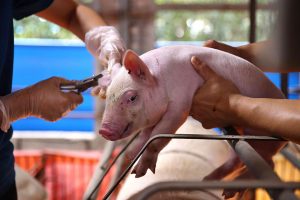
Hog output gains seen cutting pork import demand by 10%
THE Department of Agriculture (DA) said it expects a swine repopulation program to raise output by about 60,000 metric tons (MT) this year, potentially reducing demand for pork imports by about 10%.
In Memorandum Circular No. 28, the DA said it will push for the recovery of the hog industry via the establishment of multiplier and production farms employing artificial insemination under the Integrated National Swine Production Initiatives for Recovery and Expansion (INSPIRE) program.
“There is a need to enhance and refocus the implementing strategies of the repopulation program, to achieve the targets of the project,” it added.
During the first quarter, hog production declined 4.3% to 419.37 thousand MT, according to the Philippine Statistics Authority. This was a reversal from the 5.1% growth posted a year earlier.
Imports of pork, on the other hand, rose 11.9% to 128.51 million kilos in the first quarter, according to the Bureau of Animal Industry (BAI).
The DA said the INSPIRE program will focus on areas that are free of African Swine Fever (ASF).
“This will ensure the sustainable supply of breeders, feed, semen, access to markets, and overall logistical and technical support,” it said.
The DA added that beneficiaries will be adopting modern climate-controlled building systems or conventional facilities compliant with Biosecurity Level 1.
It said piglets produced by multiplier farms would be distributed to participating hog raisers engaged in contract growing or finishing.
“It is expected that this approach will reduce the possibility of ASF infection, facilitate sustained production of piglets, provide of technical support to beneficiaries, and enable efficient monitoring organized by the farmer cooperatives and associations (FCA),” the DA said.
It added that beneficiaries may opt to avail of a production farm package worth P5.5 million to P16.2 million.
As of June 21, 10 provinces had active cases of ASF across 21 municipalities, according to the BAI. — Adrian H. Halili



